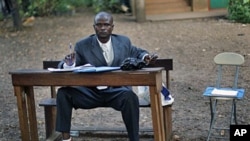Voters in Guinea are awaiting the results of a presidential election that is meant to end nearly two years of military rule.
Guinea's electoral commission has until Wednesday to announce results from this second-round run-off. But that deadline may slip as there are already delays in transporting results from some rural polling stations.
Sunday's contest between former prime minister Cellou Diallo and long-time opposition leader Alpha Conde appears to have gone well, with only minor logistical problems reported.
Electoral commission president Siaka Toumany Sangare says voters across the country cast their ballots in calm, serenity, and restraint.
Violent clashes between Diallo and Conde supporters during the past month delayed this vote.
A joint statement from electoral observers with the African Union, the Carter Center, and the European Union says voters turned out in a great numbers to peacefully determine Guinea's future. The observers appealed to both candidates' "sense of responsibility" to maintain calm during the wait for results.
Carter Center vice president for peace programs John Stremlau is leading this observer mission alongside former Nigerian leader Yakubu Gowon. Stremlau says it is largely up to Diallo and Conde to determine what happens when final results are announced.
"My appeal to them would be my appeal to political leaders anywhere: to be generous in victory, magnanimous in defeat, put the country ahead of your own interests, and remember that future generations will look to this moment in Guinea's history, I would imagine with inspiration and confidence if it goes well," said Stremlau. "And that is a great legacy for your children and your grandchildren."
The vote is meant to return Guinea to civilian rule nearly two years after soldiers took power following the death of long-time leader Lansana Conte. The country's acting military leader, General Sekouba Konate, is leading this hoped-for transition to civilian rule, warning before Sunday's vote that the military will not tolerate any violence. It is easy to start, he said, but difficult to end.
Voters in Guinea Await Results of Presidential Run-Off




